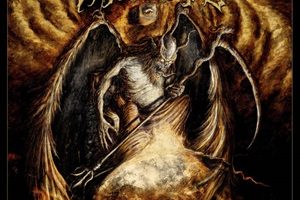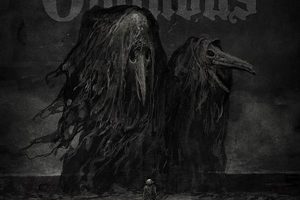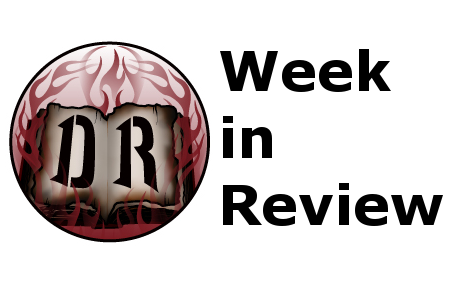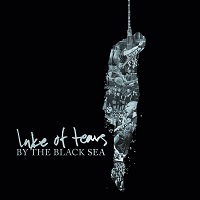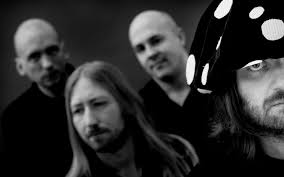Lake of Tears – Cosmic Seclusion
Thursday, 11th February 2021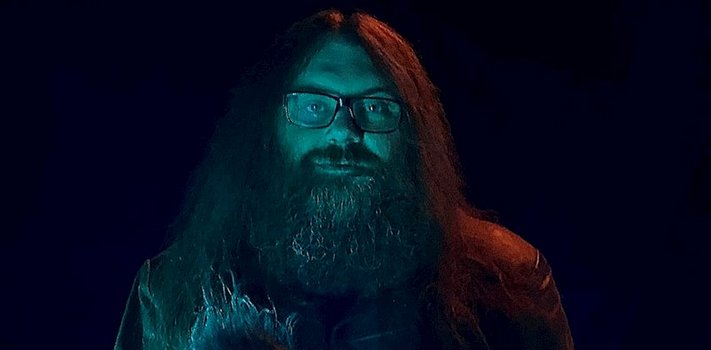
Intertwining a mix of gothic, progressive, and post-metal/rock styles, Lake of Tears has been marching to their own accord since the 1990’s. We all have our favorite records in the discography – this scribe partial to A Crimson Cosmos (1997) and Moons and Mushrooms (2007) – but you have to admire, respect, and appreciate musicians that willingly follow their head and heart no matter how different the output becomes record to record. Probably scary for the record labels to market on their perspective, but in the end, diamonds come out of that terrain.
Ominous is the latest Lake of Tears record – their first in a decade. As you’ll discover in this talk with Daniel Brennare, the group has siphoned down to only him. You’ll learn more about the long gap between records, his thoughts on using home technology tools to aid the recording, favorite memories with the band – and why he is thoughtful when it comes to discussions regarding his favorite topics of math, philosophy, psychology, and the cosmos.
Dead Rhetoric: Ominous is the ninth and newest Lake of Tears album, and first in a decade. What circumstances took place for the long gap between releases?
Daniel Brennare: Of course, it has been a decade and there are many circumstances, but the most important circumstance is that there is a story inside this record and I have been inside this story. It had to come to a certain point for me to finish it up.
Dead Rhetoric: What came first when developing this album – the musical themes or the storyline? Do you find it’s easy or challenging to keep both elements in sync for the duration of the record?
Brennare: If we start from where it actually started, it started from when I was diagnosed with leukemia. This is when it actually started from, the illness and the following depression that came from this. That’s the baseline where the story goes in this record. From there on, it was mixed. When I got the first idea, the first note, the first word, it all started to come together so everything was influencing the other parts. I was using mathematics and stuff to fit things all together.
Dead Rhetoric: When did you first find out you were diagnosed with leukemia, and how did you handle things? Is it in remission at this point?
Brennare: It was twelve or thirteen years ago. It had been affecting me for some time before that, my energy was drained. That is when I got the diagnosis from this, and I was in and out of the hospital for a couple of times. Actually my form of leukemia is not severe, if you compare it to other forms. It is chronic, it will be there and shorten my lifespan. I think the survival percentage is 97%. After the third time I was in for treatment, my body broke down and started to shake, I had all kinds of brain things. I lost the last drop of energy that I had.
Dead Rhetoric: And when it came to the recording of the new record, was there any specific reason why outside of hiring a session drummer that you worked on everything yourself?
Brennare: The main reason here is there really is no band anymore. People started to float away during the Illwill period, about 2012 somewhere. Johan (Oudhuis) the drummer was the last person to leave four years ago, and I already started to rehearse some of this material with him. It was quite a difficult time at first because I didn’t really know how to do everything by myself, but after a while it started to get into a sort of relief. I had written some songs myself in the past so it wasn’t really a new process in that way. The new thing was to make this into complete demo songs on the computer, I had to learn a lot of stuff that I didn’t know before like compressors and EQ’s, just to make it sound a bit better.
Dead Rhetoric: Do you enjoy the current recording technology at your disposal compared to the days when you went into bigger, professional recording studios?
Brennare: I would say both. It’s really good today because you do stuff today a lot cheaper than in the old days. At the same time it gives you so many options, it can push the decisions forward all the time. That can make it quite tricky in the end.
Dead Rhetoric: Were there any songs that in the writing or recording stages that were tricky or more difficult than others?
Brennare: No, I don’t think so. I have always been a little worried with my vocal takes, but it went smooth this time. There are some guitar riffs, tremolo articulation, faster picking – there are some parts that on this record were probably the most challenging ones. I’m getting older so my arm was getting really tired, and I don’t usually do that stuff.
Dead Rhetoric: How did the artwork by Vladimir Chebakov come about – as it definitely paints a picture that matches the Ominous title?
Brennare: I have a Russian friend named Andre who I have been in contact with for many years. He helped us out for some shows there, and we also have a Lake of Tears fanpage. He had used Vladimir to do some covers before, so we just discussed it and when I really didn’t know who I was going to try out. He thought he would be suitable, he got together with some sketches I had done. I sent him those along with some pictures I found on Google and described the stories. By using Google Translate it ended up coming together very well in the end.
Dead Rhetoric: How do you see the development of Lake of Tears over the years – as you’ve definitely shifted styles and atmosphere taking you where your creative mind and output desires? Do you believe as an artist it’s important to go where you wish to go in terms of songwriting and output, regardless of what you’ve established previously and how it affects your fanbase?
Brennare: Yes I think as an artist, at least for me as an artist it’s very important. And more important the older I get. I get more annoyed the older I get about this stagnation. It’s not that I dislike most music, but I dislike that it’s not doing any kind of progression. I am a product of my own time. I’ve heard the same stuff from thirty years now, so I know it’s really difficult to try out some new stuff with the same equipment. More bands should try it- the thing about music is if you always look back, there has to be something new coming out.
Dead Rhetoric: Would you say A Crimson Cosmos as an album gave you more of that confidence to shift gears due to the acceptance of that record?
Brennare: Maybe somewhere during these times. For the Headstones album, people that listened to that agreed that was a step forward. From A Crimson Cosmos on there were always a bunch of people complaining that things were too different compared to the old records. I don’t know if it gave me confidence, but it somehow let me loose perhaps a bit more.
Dead Rhetoric: What keeps you motivated in a music industry that can be very turbulent and ever-changing?
Brennare: Oh, how deep do you want me to go into that question? I have thought about that a lot. I’ve been so skeptical over the last fifteen to twenty years about doing new material. I just don’t feel that this is the thing for me. I must say I have found comfort in totally different areas than music. Mathematics, psychology, philosophy, musical theory. I get into orchestral stuff now. The math aspect, if you go down to frequency levels, to 4000 years to Pythagoras when he was putting his musical system together, those kinds of things are my driving force now. If I do more stuff it will get deeper into that stuff. This record is quite deep into it but not quite so deep that people will be put off to it.
Dead Rhetoric: Would you say bands like Pink Floyd and Sisters of Mercy are more prevalent as far as influences than past Lake of Tears albums?
Brennare: Well, maybe. Both Pink Floyd and Sisters of Mercy have been there from the beginning. Maybe not so prevalent on the earlier records. Even from the middle of the 90’s, you can hear more Pink Floyd influences at first and then recently one song on every record has a bit of Sisters of Mercy influence in some way.
Dead Rhetoric: As you just celebrated your 49th birthday, how have your views about life changed and developed?
Brennare: That’s a really big question. These experiences that I have had over this last decade changed my view of life. It has built upon my earlier reflections on life, and become more black and white and sharper. I really don’t feel like I have time to discuss things with people that I find totally uninteresting. That’s one thing that everybody does – sitting at work or in the cafeteria and discussing the weather, or soccer, for me that’s not really interesting. What I noticed quite early in my life it was also the other way around – when I started to talk about subjects that were interesting to me, people stopped listening to me after half a minute. Either people didn’t understand it, or it wasn’t their areas to discuss. I have become more and more secluded the more the years go by.
I really don’t feel like I want to get involved with the world so much. Someone mentioned somewhere to go find the others – that’s the thesis that I live by. I want to find those people that I can connect with, that has become more important to me.
Dead Rhetoric: Do you prefer deeper discussions with people about subjects you are interested in such as math, psychology, etc.?
Brennare: Yes. It doesn’t have to be just those subjects. Let’s say we discuss politics with all these elections. I really enjoy people that have been reading about this stuff or have a philosophical view because so many people you just have to question what they say. They don’t even have one level of deepness or logical reasoning for what they are saying.
Dead Rhetoric: What do you consider some career highlights with Lake of Tears – specific tours, albums, videos, festivals, or other events where you knew you were achieving something stronger and long-lasting with your music?
Brennare: There are quite a few of those. I think it started with the Headstones record. We got in contact with Frank Albrecht the German guy who was writing for a metal magazine Rock Hard. He became our manager and he gave us the opportunity to play on bigger stages, even before we were ready. Some countries, like Russia and Romania, when we came it was such a strange experience. Going from playing at most to a couple hundred people to a couple of thousand people. I don’t know how to describe it, our music was a part of their DNA, that was the feeling.
Dead Rhetoric: Have you had the chance to check out the two tribute albums released in 2012 and 2014 of Lake of Tears material? If so, what band(s) and songs stood out to you, and how does it make you feel to know you’ve had that much of an impact with your music on others?
Brennare: Let’s start with impact. That’s a totally amazing thing, I couldn’t wish for anything else. That’s a cosmic thing, you live on after you are dead in some way. I listened to them a couple of times. I can’t remember all of it, I really liked a band called Equinox of the Gods, they did “Planet of the Penguins”. I also thought the Draconian song “Demon You/Lily Anne” was really good.
Dead Rhetoric: How much longer do you see Lake of Tears progressing – do you just take things on a moment by moment, day by day basis or are you someone who likes to plan things out months to years in advance?
Brennare: I think I am taking this on a moment by moment basis but I do like to plan things. I already have two big plans in my own head regarding musical works, but I am not sure under which name they will come out. Whether it’s Lake of Tears or something else, since it’s just me in the band now. Nowadays a band can be one person all the way up to fifteen people, and that’s okay – but it’s still hard to swallow for some people that there is only one band member left. I remember when I was younger if I loved a band and people left I would wonder what is happening?
Dead Rhetoric: What’s on the horizon for Lake of Tears over the next twelve to eighteen months? Will you assemble a new lineup to do some shows when the pandemic finally subsides and it’s safe to play live?
Brennare: That’s a pretty slim chance I would say. On the horizon right now there aren’t any live shows. If I can find in myself to find some new context to be able to go and play live, maybe that can happen. I’m quite tired of the context that always follows in the rock and metal genre. Not that I hate it, but it’s not that interesting for me anymore.











